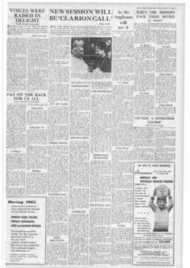Page 4, 14th December 1962
Page 4

Report an error
Noticed an error on this page?If you've noticed an error in this article please click here to report it.
Tags
Share
Related articles
Spain In Transition
Protestants' Bill Passes Spain's Bishops
Gibraltar And The Spaniards
Gibraltar And The Spaniards
Wind Of Change Comes To Spain
PROTESTANT EMANCIPATION
CONCLUDING
SPAIN IN TRANSITION
By HUGH KAY In this, the last of his four articles on "Spain in Transition", HUGH KAY describes a conversation with the Spanish Foreign Minister, and discloses for the first time the major steps now being taken by the Spanish government to free the Protestant community from civil disabilities.
pEW issues have done Spain more harm than her attitude towards her Protestant minority, As a result of a recent interview with the Spanish foreign minister, Senor Castiella, I am able to disclose details of the major steps now
being taken to alter the situation radically.
Senor Castiella's own mind was formed by Pope Pius XII, in whose pontificate he was Spanish Ambassador to the Holy See, and over the past six years he has worked incessantly for a solution that would bring Spain into line with the current thinking of the Church.
Why has it taken so long to reach this point? In the view of foreign observers in Madrid, responsibility lies primarily with the traditionalist elements in the hierarchy. Certainly, in the foreign ministry, where the problem is principally deult with, everyone from Custiella to the doorman wants Protestant Emancipation — and wants it quick.
Spanish diplomats are, of course, gravely embarrassed by this question in their dealings with predominantly Protestant countries in Europe, and with America, In Madrid they have to take an almost constant battering from the Embassies.
The foreign office men, moreover, arc a young, forward-looking team. intensely European-minded. Above all, Senor Castiella is acutely conscious that the whole situation is contrary to the real mind of the Church. To him, the fact that the Protestant community numbers only 30.000 out of a total population of 31 million is irrelevant to its claim for legal recognition.•
Local
Spanish thinking has been radically affected by the increasing contacts of the past few years with non-Catholic countries. Spain now belongs to a multiplicity of international organisations. More and more Spaniards are taking holidays abroad, especially student s, Millions of foreigners are coming to Spain in the new wave of tourism
But the central government's thinking is years ahead of some of the local and regional authorities, whose strict interpretation of the law to the letter in dealing with Protestants sometimes overspills into outright Illegality, not to mention injustice. A typical instance of this was the case of the young Protestant soldier sentenced to eight years' imprisonment for refusing to kneel at the Elevation during a church parade Mass. He should have been legally protected by a decree of 1913. which provides that non-Catholic soldiers cannot be compelled to go to Mass But a local colonel, a local court, and, it is said, a local bishop somehow cooked up a legal fiction. There had been disobedience to a military command, it was said, comparable to a refusal to present arms on a ceremonial parade. The whole affair shocked the senior ministers of the central government profoundly. and approaches were made to the Caudillo.
But, as I pointed out two weeks ago, the independence of the Spanish courts is a reality, and, once the damage is done, it is none too easily corrected. In fact, the soldier has now been released, after serving only a small part of his sentence. But he had been in prison for some 18 months or so. In a Catholic country, and especially one bound to the Holy See by a Concordat, the govern ment does not feel free to move in matters of this kind without the consent of the bishops, and the latter vary from those who would give complete freedom to Protestants tomorrow to those who seem never to have heard of Plus XII's famous statement on tolerance to the Italian Jurists.
The foreign minister assured me that his own views are accepted by General Franco and the other ministers of state, though it has been suggested in one quarter that it might he preferable to emancipate the Protestants gently and gradually in practice rather than to promulgate u law.
In principle, however, government circles arc of one mind in this matter, and one or two Catholic publications, notably the Jesuit review /tenon y Ft, have come out publicly on the aide of the angels. Considerable interest has been aroused by an unbiased analysis of Spanish Protestantism written by Fr, Prudencio Darnboriena, Si., of the Gregorian University.
I am able to disclose that Senor Custiella has drafted what is in effect a Protestant Emancipation Bill. This has been sent to the Holy See for approval, and the Spanish bishops are generally taking the line that they arc prepared to abide by what Rome says.
Not that Senor Castiella is in too much doubt about what Rome will say, because he has personally discussed the matter with Pope John, and they seem to have found themselves of one mind. But, as the whole issue of toleration is engaging the attention of the Vatican Council in the project De Ecclesia, there may be some delay in securing approval for the draft until the Council's mind on general principles is known.
This is a little disappointing to the foreign minister, not to mention his harassed ambassadors in Protestant countries, but, in the meantime, he continues to do all that he can for the Spanish Protestants on a personal basis.
He told me that he has personally investigated many of their specific grievances—such as the closure of chapels--and has succeeded in gelling them redressed in nine cases out of ten.
Toleration has, in fact. Increased in practice in the field of relations with other Churches, just as it has in most areas of social life in Spain, and, while onegrieves with the Lutheran Bishop Dibelius for the closure of the Protestant seminary in Madrid, there are items on the credit side like the payment of i1,000 compensation to a Protestant society whose books had been improperly seized.
The Bill
The seminary incident drove Bishop Dibelius to seek the help of Cardinal Fringe of Cologne, who contacted the Spanish hire.erchy and received short shrift for his pains. The latter blamed the Government by implication. Yet, in fact, the closure had been urged by church authorities.
To put the matter on its lowest level, it is clear that foreign antipathy towards Spain will never be cleared up until the Protestant question is settled.
For years it vitiated relations with the United States, and is thought in many quarters to have accounted for the denial of Marshall Aid to Spain. It has a vital bearing on Spain's application for association with the Common Market. The matter is now one of burning urgency.
if the draft Bill is passed, Protestant Churches in Spain will be given legal recognition, and will thus be able to hold property. As matters stand, their property has to be registered in the name of a foreign organisation if the title is to be preserved. This is, without doubt, the major Protestant grievance in Spain.
Furthermore, the Bill recognises civil marriages contracted between Protestants and apostate Catholics. provided only that a time lag of one month elapses to give the local Bishop a chance to remonstrate with the Catholic party before he or she contracts a union outside the Church.
Proselytising
Protestants will be able to run their own schools and distribute their own Bibles. There are some schools in operation even now, but there have been many closures of schools and chapels which will not be characteristic of Senor Castiella's new dispensation.
The only restriction almost certain to remain is the ban on public proselytising. This is, of course, built into the Concordat, and Spain is not unique in this. The government, moreover, sees no justification of lotting loose a Protestant missionary campaign on a ninety-nine per cent. Catholic population.
There is, of course. a history of violently anti-Catholic militancy on the part of certain groups in Spain. involving blasphemous references to Our Lady and the promulgation of insulting untruth about the Catholic Church which would oven shock a Wec Free, The Spanish temperament being what it is, these activities have led in the past to outright violence. You can get away with a good emany e a ce n y attacks on Catholic belief with a Spaniard, but, however weak his practice, you simply do not insult Our Lady in his pro nThis sort of thing was at the hack of the church-burning incidents of some years ago, following which the Catholic culprits were punished by the Spanish authorities and compelled to make such restitution as they could.
Today, it distinction has to he made between groups like the Snanish Reformed Church, a highly responsible body in communion with the Church of Ireland. and some of the more milloublo arises with the tillegal sects.dear to-door campaigns of people like Jehovah's Witnesses and other bodies. especially the American groups, whose intentions Continued on Page 5
blog comments powered by Disqus











